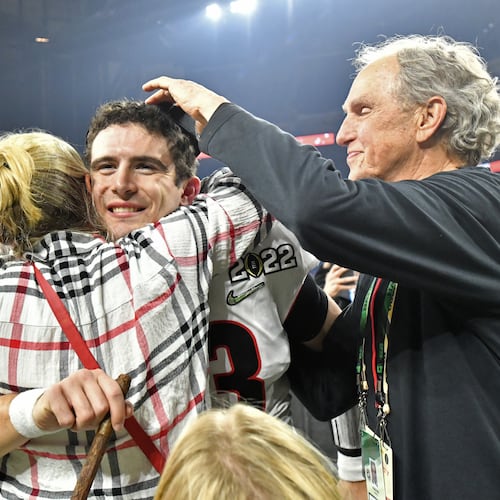In now his fifth year with the Braves, Tyler Flowers is working on his fourth partnership behind the plate. It is an interesting business model, this tough, dirty, take-a-foul-tip-off-a-sensitive-body-part time-share. But it seems to work for him. And occasionally for the Braves, too.
They come.
A.J. Pierzinski (2016). Kurt Suzuki (’17 and ’18). Brian McCann (’19). And now Travis d’Arnaud, signed as a free agent for two years and $16 million.
They go.
They move on somewhere else. They retire. They decide there is something else just as fulfilling out there as squatting for a living.
Flowers stays.
How does that work?
“Maybe because I live in Atlanta?” he cracked, suggesting that he is at least the convenient option.
In this commune of catchers, where there is such freedom of movement, Flowers, a Roswell guy, has been the constant. The Braves have made this two-headed catcher thing work for them throughout their rebuild, with Flowers starting an average of 76 games behind the plate over his four years. It’s not the perfect solution, but it sure beats just throwing pitches off the umpire’s chest protector.
This year, Flowers is in partnership with Chase d’Arnaud’s little brother, Travis. He’s the quieter d’Arnaud, by all accounts. Their choice of instruments – they come from a most musical family – underscores as much. Chase, a charismatic Braves utilityman for about a minute, is loud guitar. While Travis is piano.
Playing with his third team of 2019, Travis boosted his value while with Tampa Bay, hitting .263 with 16 home runs and 67 RBIs in 92 games. That positioned him to be maybe the second most sought-after catcher on the free-agent marketplace.
As such, he surely will bleed more playing time away from Flowers. But the way a 33-year-old veteran looks at it, there is plenty to go around. Especially during the heat of an Atlanta summer and when, as in his case, he tends to sweat waterfalls.
“I think it’s unrealistic to pull off a run like Brian McCann did at the beginning of his career,” Flowers said. Over one four-year stretch early in his first pass through Atlanta, McCann caught an average of 129 games per season.
“I still don’t know how he did that for that long. It’s extremely difficult to start 120 (games) in Atlanta. With the conditions, it makes it almost impossible. I have a more difficult time than most with the heat and sweating and cramping, so I know it would be a challenge for me. I think it has been a real good fit. It has been a good way to balance starts and kind of keep both catchers fresh.”
Making the two-headed catcher arrangement work has required some give-and-take from all parties. And Flowers realizes just how fortunate he has been to be paired with other like-minded players.
“They all have been a lot of fun to work with,” he said of his partners in catching. “Those are kind of abnormal situations for the catchers to get along, genuinely root for each other. And I’ve known Travis for a few years, as well. It’s the same kind of relationship. It has been pretty neat and unique.”
The Braves opted not to exercise their contract option on Flowers this year. Instead, in a move that contained advantages only a CPA can explain, they re-signed him to a one-year, $4 million deal.
Last year, Flowers was flat at the plate, hitting .229 with 11 home runs and 34 RBIs in limited action. Given the nature of his position, that would be more than palatable if counter-balanced by his defense and his knack for drawing the most out of the Braves’ young pitchers.
But then arose an interesting development. In his zeal to steal a strike here or there – he is reputed to be a fine framer of pitches, a master in the art of umpire persuasion – Flowers became more apt to outright whiff on pitches. He led baseball in passed balls (16 in just 83 games). To be a catcher, one must catch. It’s right there in the job title.
Agree with it or not, Flowers’ take on this issue is well thought-out. Most of his views are. By his own risk-reward analysis, the effort to get a strike called on a pitch that may not technically be a strike is worth a passed ball. Or two. Or more.
“It’s part of the game. If you want to be a good receiver you have to take chances,” he said.
“I’m trying to be a little smarter about some of those chances. I’m not going to limit something I’m really good at. I’m still going to take my shots to do what I believe is what they want me to do and is valuable in the game: That’s getting borderline pitches and pitches out of the zone called strikes. I’ll try to be a little bit smarter, but I’m not going to get outside of my game for a few passed balls. Or a lot of passed balls, even still.”
There are plenty of compromises to be made when you’re part of a catching tandem. For season after season, Flowers has made them, without complaint.
But on this part of his game, one in which so much personal pride is involved, he is not anxious to bend. We have found the limits of his tolerance.
About the Author
The Latest
Featured


